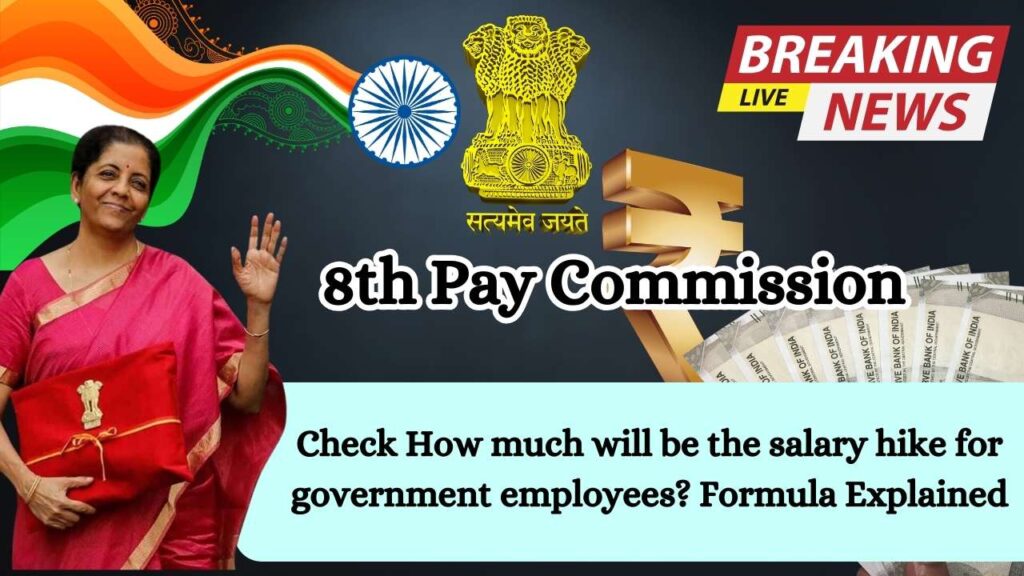8th Pay Commission – The 8th Pay Commission is a much-anticipated topic for millions of central and state government employees in India. The commission, which is expected to be implemented in 2026, aims to revise the salaries, pensions, and allowances of government workers. But how much will salaries increase? What is the formula used for calculating the hike? Let’s break it down in a way that is easy to understand.

8th Pay Commission
| Feature | Details |
|---|---|
| Expected Implementation Year | 2026 |
| Projected Fitment Factor | 2.86 (tentative) |
| Minimum Salary Increase | From ₹18,000 to ₹51,480 |
| Expected Pension Increase | From ₹9,000 to ₹25,740 |
| Basis for Calculation | Aykroyd Formula (Living Costs, Inflation) |
The 8th Pay Commission is set to bring a major salary and pension revision for government employees. With an expected fitment factor of 2.86, salaries could see significant hikes, improving financial stability. The revision will also include allowances, medical benefits, and DA increments. Stay updated with official announcements to get accurate information on the 8th Pay Commission implementation.
Understanding the 8th Pay Commission
The Pay Commission is a government-appointed body that reviews and recommends salary structures for central government employees every 10 years. The 7th Pay Commission, which was implemented in 2016, introduced the fitment factor of 2.57, raising the minimum basic salary from ₹7,000 to ₹18,000.
The upcoming 8th Pay Commission is expected to further increase salaries, taking into account inflation, economic growth, and cost of living.
Why is the Pay Commission Important?
- Ensures that government employees receive salaries that match rising living costs.
- Affects pensions of retired government workers.
- Impacts state government employees, though implementation varies by state.
- Boosts economic activity, as higher salaries increase spending power.
- Helps in reducing income disparity between government and private sector jobs.
How is the Salary Hike Calculated?
The salary increase under the 8th Pay Commission will depend on the fitment factor, a multiplier applied to the existing basic pay to determine the new salary.
Formula for Salary Hike
New Salary = Current Basic Pay × Fitment Factor
For example:
- If a government employee’s current basic salary is ₹18,000, and the expected fitment factor is 2.86, the new salary will be: ₹18,000 × 2.86 = ₹51,480
What is the Fitment Factor?
- The fitment factor is a crucial component in salary calculation.
- It was 2.57 in the 7th Pay Commission and is expected to be 2.86 in the 8th Pay Commission.
- The higher the fitment factor, the greater the salary increase.
Additional Allowances & Benefits
Apart from basic pay increments, employees can expect:
- House Rent Allowance (HRA) Revision: Expected to rise proportionally.
- Transport Allowance (TA) Hike: Likely increase to match fuel and commuting costs.
- Medical Allowance & Health Benefits: Enhanced benefits for government employees and pensioners.
Understanding the Aykroyd Formula
The Aykroyd Formula, developed by economist Dr. Wallace Aykroyd, is used to determine wages based on an individual’s nutrition, housing, clothing, and overall living expenses.
Factors Considered in Salary Calculation
- Inflation Rate: Rising prices of essential goods.
- Economic Growth: GDP and government revenue.
- Minimum Wage Standards: Living costs for a family.
- Previous Pay Commissions’ Recommendations.
- Cost of Living Index (CLI): Determines affordability in different regions.
Expected Salary and Pension Hikes
| Category | Current (7th Pay Commission) | Expected (8th Pay Commission) |
|---|---|---|
| Minimum Basic Salary | ₹18,000 | ₹51,480 |
| Minimum Pension | ₹9,000 | ₹25,740 |
| Fitment Factor | 2.57 | 2.86 (tentative) |
| Maximum Basic Pay (Cabinet Secretary Level) | ₹2.5 lakh | ₹7.15 lakh |
What Employees Can Expect from the 8th Pay Commission
1. Higher Salaries
- A projected fitment factor of 2.86 could result in a significant salary increase.
- Employees earning ₹50,000 could see their basic pay jump to ₹1,43,000.
2. Increased Pensions
- Pensioners will benefit from higher payouts, making post-retirement life more comfortable.
3. Dearness Allowance (DA) Revision
- DA is expected to be increased, benefiting employees and pensioners.
4. More Financial Stability
- Increased salaries mean higher savings and purchasing power, boosting economic growth.
5. Impact on Private Sector Salaries
- The government pay hikes often influence private sector wage structures to remain competitive.
India’s Premier Airshow, Aero India 2025, Set to Take Off – Check Details
FAQs about 8th Pay Commission
1. When will the 8th Pay Commission be implemented?
The 8th Pay Commission is expected to be implemented in 2026, but an official announcement is yet to be made.
2. What is the fitment factor in the 8th Pay Commission?
The expected fitment factor is 2.86, meaning salaries will be multiplied by 2.86 to calculate the revised pay.
3. Will state government employees also get a salary hike?
Yes, but state governments decide how and when to implement the revised pay scales.
4. How does the Pay Commission impact pensions?
Pensions increase in proportion to the salary revision, benefiting retired government employees.
5. Where can I check official updates?
Visit the Government Pay Commission Portal for official updates.







